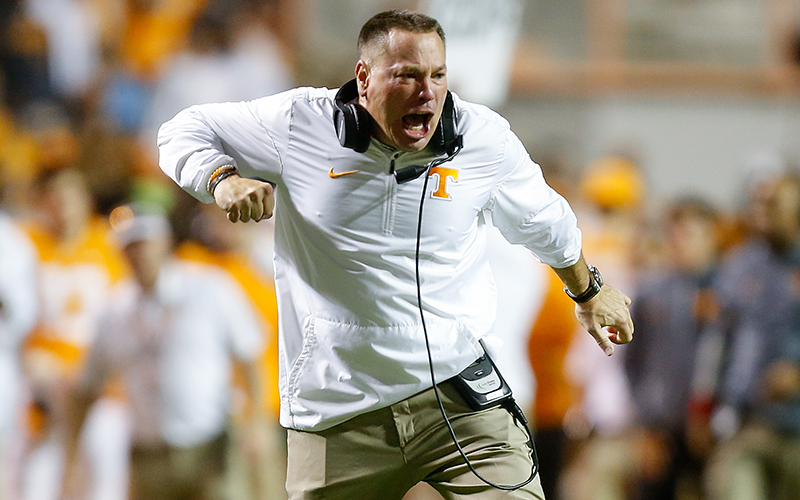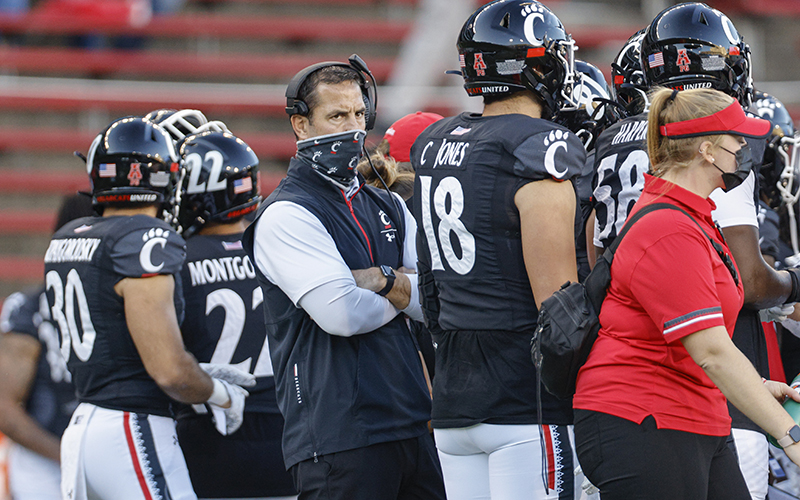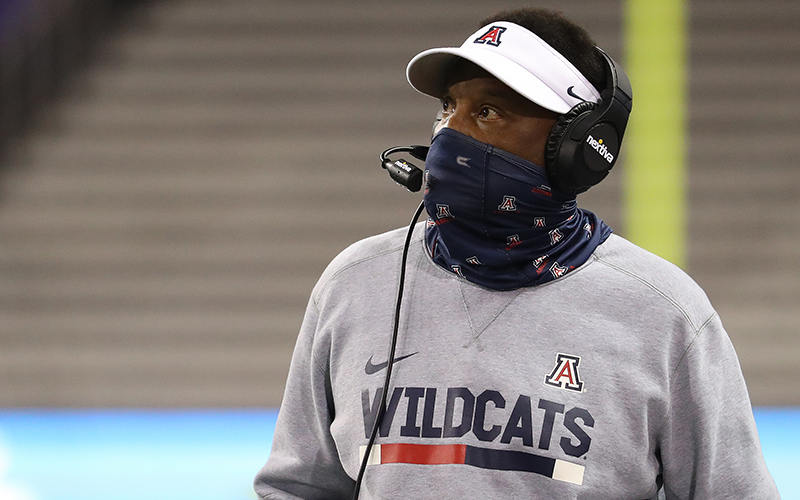PHOENIX – College football coaches were supposed to be immune from the wrath of COVID-19.
Right?
Not immune, of course, in terms of infection or exposure to the virus. But immune in the sense that no matter what game days delivered in 2020, losing records would receive a pass. Struggles realistically could be chalked up to constant disruptions this fall, and an offseason plagued by unusual circumstances. And head coaches would theoretically outlast the last phases of uncertainty, and remain employed to fight another down because nobody deserves to be kicked to the curb while battling an unforeseen opponent as viciously defiant as the coronavirus.
Perhaps, that faith is out of touch with reality.
Vanderbilt’s dismissal on Sunday of Derek Mason, who was off to an 0-8 start in his seventh season at the helm of the Commodores, marked the latest in a line of veteran coaches to be cast aside, despite rampant financial concerns looming over athletic departments across the country.
Mason’s firing created a fourth FBS vacancy (Tulane offensive coordinator Will Hall was announced as Southern Miss’ new head coach on Thursday). Vanderbilt joined South Carolina, Utah State and the Eagles, who fired Will Muschamp, Gary Andersen and Jay Hopson, respectively — approximately eight decades of coaching experience.
It surely won’t be the last. As college football advances further into December, and what’s bound to be a hodgepodge bowl season, programs could very well opt to cut the cord on overpriced coaching contracts and abysmal cultures and aim to start from scratch in 2021.
Many coaches entered the season already edging onto hot seats: Michigan’s Jim Harbaugh, Nebraska’s Scott Frost, Texas’ Tom Herman, Southern California’s Clay Helton.
And they could all be on their way out of town by season’s end.
Several others might begin to feel the heat due to middling accomplishments, including Auburn’s Gus Malzahn, Kansas’ Les Miles, Houston’s Dana Holgorsen and Tennessee’s Jeremy Pruitt.
There’s one, however, that juts out from the rest of the pack: Kevin Sumlin, entrenched in his third season manning controls at the University of Arizona.
Here’s why
The Wildcats’ coach is winless through three games, and has lost 10 straight dating back to last year’s 51-27 thumping at the hands of the Washington Huskies.
Several themes have been common over Arizona’s streak of losses: an undersized defense has proven incapable of consistently stalling opposing teams’ drives; dangerously hot-and-cold special teams act as a kryptonite; a talented cast of offensive playmakers clash with play-callers, while striving to overcome self-inflicted wounds.
Stats reinforce the observations.
In 2019, Sumlin’s squad ranked 123rd (out of 130) nationally in third-down defense as opponents moved the chains 47% of the time.
Similarly, Arizona’s net punting average (34.5 yards) a year ago finished at the bottom of the NCAA’s Division-I barrel, checking in at the 125th spot.
Consequently, the Wildcats’ offense regularly found itself under heavy pressure to score points.
Some flip-flopping at the quarterback position, some scrutinized early-down decision-making and a little bit of desperation resulted in the third-highest interception total (12) in the Pac-12, the conference’s third-most sacks allowed per game (2.75) and the lowest average time of possession (27:24) of all but 15 teams nationwide.
Adjustments were made to Sumlin’s staff in the offseason. Former Iowa State coach Paul Rhoads replaced Marcel Yates, a 2019 midseason firing, as defensive coordinator, and 40-year coaching veteran Stan Eggen was added as a defensive assistant in hopes of boosting the unit’s performance along the defensive line. Yet, Arizona football fans haven’t had much to root for this year.
The Wildcats offense has converted on just 32% of third-down tries this season, a mark that sits dead-last in the Pac-12. Arizona’s performance defensively and on special teams — albeit, the current sample size is much slimmer than usual this time of year — has been equally as disappointing.
Rhoads’ group is surrendering an average of 229 yards the old fashioned way, giving up a demoralizing 35 points per game in the process. Neither, are winning numbers.
The Wildcats’ schedule is arguably toughest down the stretch. Saturday’s opponent, Colorado, is unbeaten, and Arizona State likely feels cheated out of a once-promising season, so Sumlin could start to sweat with two games left.
In true 2020 style, with all uncertainties in mind, let’s take a peek at six potential candidates if Arizona cuts ties with Sumlin.
Butch Jones
An old pal of Arizona’s athletic director Dave Heeke, Jones is more than three years removed from his last stop as coach at Tennessee. But he is still immersed in one of college football’s elite environments at Alabama, where he currently serves as a special assistant coach to Nick Saban.
Heeke originally hired Jones to replace Brian Kelly at Central Michigan in 2007. It wouldn’t be shocking if he tried to sway Jones his way, again. It would actually be a tad bit ironic because former athletic director, Greg Byrne, made Heeke’s position available in the first place when he up and left for Alabama.

The candidacy of Butch Jones makes sense because he has a long-standing relationship with Arizona athletic director Dave Heeke. (Photo by Michael Reaves/Getty Images)
A Heeke-Jones reunion would be fitting, but the former would need to convince the latter that he retains the same vision he had when he originally came to Tucson. The same vision that inspired Jones at CMU to rally off 27 wins in three years, and the same vision that prompted Jones to laud Byrne’s replacement, publicly.
This is what Jones, a Michigan native, had to say in February 2017 of his longtime confidante: “The University of Arizona hired one of the premier athletics directors in the country. Dave has the ability to connect with people and has a vision that is second to none. Above all else, he and his family are great people. Dave will be a tremendous asset to the University community, city of Tucson and the entire state of Arizona.”
Jones was initially rumored as a contender to fill the void left by Rich Rodriguez’s sudden firing, but obviously took a backseat to Sumlin in Heeke’s mind. Or, perhaps Jones felt the opportunity wasn’t right.
In close to five full seasons leading the Volunteers – he was dismissed from Tennessee in 2017 with two games remaining, his team still searching for its first win in the Southeastern Conference – Jones compiled a respectable 34-27 record. He boasts 84 career victories against 54 losses.
Jones was ousted just a year after back-to-back nine win seasons due mainly to what “Rocky Top” fans refer to as the storied program’s worst season ever. In hindsight, Jones, 52, said he wishes he could have done things differently. He would have paid greater attention to the trainers, equipment managers, strength coaches and how they operate.
Since then Jones has buddied up with Saban, out of the spotlight, and has reportedly done well for himself. He has likely learned a thing or two from the six-time national championship-winning coach.
Maybe Jones gets another crack at being Heeke’s running mate, 1,537 miles from Tuscaloosa.
Billy Napier
Napier deserves major credit for the complete turnaround he’s choreographed in just three seasons at Louisiana-Lafayette.
The Ragin’ Cajuns coach, and reigning Sun Belt Coach of the Year is 27-11 since departing his post as associate head coach on Herm Edwards’ staff at Arizona State in December 2017. In his sole season as the Sun Devils offensive coordinator, ASU’s offense graded out as the 14th best in the nation, per Pro Football Focus.
In three seasons before Napier’s arrival, Louisiana had fashioned a modest 15-22 record. It’s now ranked the No. 25 team in the country, largely thanks to a revitalized attack spearheaded by two 600-plus-yard rushers and a 2,000-yard passer – and it snapped an eight-game losing streak to conference foe Appalachian State on Friday, even if the ending, that included intentionally taking a safety, raised some eyebrows.
Napier, 41, starred at quarterback at Furman University in South Carolina before commencing his coaching career at Clemson, and has since impacted offenses at South Carolina State and Alabama, where he groomed future NFL receivers Amari Cooper, Calvin Ridley and Robert Foster.
Although Napier is more established in the South, his brief stretch at Arizona State could translate to immediate success on the recruiting trail out West.
More specifically, his prowess as a recruiter could help the Wildcats lure more players from the greater Phoenix area, something the Wildcats have struggled to do during Sumlin’s tenure.
One of a few possible downsides to vying for a name as hot as Napier’s would be leverage in negotiations. He’s slated to make $880,000 this season — a fraction of most Power Five head coaches’ salaries, meaning he’s due for a hefty payday.
Louisiana would likely make Napier’s exit a difficult choice. In October, Director of Athletics Bryan Maggard told Sports Illustrated, he believes he can entice Napier to stick around for several more years by making a significant financial commitment to the program, such as an impending “capital campaign to go toward a $65 million stadium renovation.”
If Napier does test the market, Arizona’s own upgrades to infrastructure may catch his attention. Recruits can now be sold on bearable winters and air-conditioned summers.
Kenny Dillingham
Simply put, he’s one of college football’s fastest rising stars.
Dillingham, 30, became the youngest offensive coordinator in the SEC two years ago when he was hired by Gus Malzahn at Auburn. Before that, he served under Mike Norvell at Memphis for three seasons, transitioning from graduate assistant status in 2016 to quarterbacks and tight ends coach in 2017, earning his coordinator stripes the following year.
Now, he’s teamed up with Norvell again. Both are in their first seasons at Florida State.
Dillingham is far from home, however. He’s an Arizona State graduate who began his college coaching career as an offensive assistant for the Sun Devils. But his deep-seated roots in the Valley date back to Chaparral High School in Scottsdale where for one year he served as the Firebirds’ quarterbacks coach and offensive coordinator, and led the state’s top-ranked offense down south for the Division-II high school state championship game played at Arizona Stadium.
An immediate return to familiarity doesn’t seem all too likely given his brotherly bond with Norvell. But Dillingham has always been “a diehard” for “chips and salsa,” both literally and figuratively, and he would be a potential bargain for the Wildcats because his age pales in comparison to most other candidates.
It helps that he’s a proven recruiter. Dillingham’s all-out effort helped reward FSU with one of Arizona’s top 2020 quarterback prospects, Chubba Purdy, who hailed from Perry High in Gilbert, and was beginning to factor into the Seminoles’ offensive game plans before undergoing season-ending collarbone surgery.
It also helps that he’s smart, fast on his feet and hungry to be great. In an interview in July, Dillingham said, “You can’t focus so much on the big picture that you lose sight of what matters. And, it goes back to, you know, the motto of our team, (it’s) kind of the motto that you can use in every aspect of your life: climb. Just keep climbing. And if you keep climbing, eventually, you’ll get to where you want to go.”
In 2018, Dillingham coordinated an offense at Memphis that shattered school records. The Tigers’ rushing assault, led by the trifecta of Darrell Henderson, Patrick Taylor Jr. and Tony Pollard, finished fourth-best in the nation, nearly eclipsing 4,000 yards.
In his lone season at Auburn, Dillingham helped quarterback Bo Nix break freshman program records for completions, passing yards and touchdowns through the air. In the last game of his short stay, his unit dropped 48 points in an upset win over No. 5 Alabama — tied for the most points ever allowed by a Crimson Tide defense tutored by Saban.
Dillingham would have what he needs skill-position-wise to make an immediate impact, plus the wherewithal to attract competitive talent if the happenstance ever arose to come home. His youth makes him relatable, and his connections in the state give him tons of potential.
Luke Fickell
Fickell, 47, has spent almost his entire life playing and coaching football in Ohio, so this would be a colossal change in scenery.
But the Columbus native does have links to the desert, though they’re considerably minor, and he is poised to land a Power Five gig this offseason, having led No. 7 Cincinnati to consecutive 11-win seasons, and is perched on the brink of a spotless 2020 campaign heading into next Saturday’s contest versus No. 24 Tulsa.

His success at Cincinnati has thrust Luke Fickell into a national spotlight. (Photo by Michael Hickey/Getty Images)
Fickell will likely be one of, if not, the top name rumored to be on the move in the next few months. And if Arizona presents itself as an opportunity, he could reasonably swap cloudy skies and cold weather for sunshine and a dry heat.
It at least wouldn’t be his first time visiting state No. 48.
While serving in various coordinator and position roles at Ohio State, Fickell made six trips to the Fiesta Bowl, and coached in the 2007 BCS National Championship game in Glendale. He was originally hired by Buckeyes head coach John Cooper in 1999 as a graduate assistant — following a yearlong journey on the New Orleans Saints injured reserve list — and later climbed the ladder on Jim Tressel’s and Urban Meyer’s staffs. He’s presently four seasons deep at Cincinnati, after spending 16 years coaching at The Horseshoe.
Fickell’s even familiar with knocking down the Wildcats’ biggest rival — Arizona State.
In 1997, as a nose guard with a torn biceps, he helped his alma mater (Ohio State) thwart the 11-0 Sun Devils and senior quarterback Jake Plummer from capturing the Rose Bowl in Pasadena.
For that reason alone, Arizona’s faithful likely wouldn’t be opposed to a Buckeye entering Wildcats territory.
And if that oddity doesn’t suffice, Fickell’s track-record of bringing in NFL-caliber recruits, one class after the next, should do the trick.
He worked closely with linebackers Bobby Carpenter, A.J. Hawk, Ryan Shazier and Darron Lee during his run at Ohio State, all first-round draft picks.
Charlie Ragle
Ragle is another guy with super strong ties to the Grand Canyon state.
He’s currently working through some kinks in his fourth season at Cal — his second exclusively serving as the Golden Bears’ special teams coordinator — but he’s built to be a head coach, somewhere, and there’s little reason why it can’t be Arizona.
For five years, Ragle was the gold standard head coach at the state’s high school level. He orchestrated three consecutive state championships at Chaparral High before leaving to become assistant director of football operations at UArizona in 2012.
After spending a season in that role, where he primarily interacted with local recruits and high school teams, running camps and clinics for future Wildcats, Ragle was elevated to handle special teams and tight end duties.
Over the next four seasons, he helped develop All-Pac-12-Second-Team punter Drew Riggleman, the conference’s points-scored leader, kicker Casey Skowron, in 2014, and two more reliable place-kickers in Jake Smith and Josh Pollack, who converted 45 combined field goal attempts.
At Cal, Ragle has been instrumental not just at developing future NFL talent, like current New York Jets safety and 2020 third-round draft pick Ashtyn Davis, who excelled returning kicks, but also at stealing recruits from his old stomping grounds. In the past three recruiting cycles, Cal has landed nine scholarship players from Arizona high schools, which, coincidentally, happens to be the same number Sumlin’s staff has scored.
Of course, recruiting in college football is rarely a solo effort, but Ragle’s part in landing some of the state’s top talent speaks for itself — he knows how to build a rapport with student-athletes.
In a July interview, Ragle, 44, said, “I think in order to have success, it’s all about people first, and investing in people and those relationships, and when you do that it’s going to pay its way forward tenfold.”
Pair his commitment to others with legitimate chops on the recruiting trail, a keen understanding of what it takes to lead a successful program, and a serious eye for talent, and a knack for honing that talent – Ragle played a pivotal role in the early stages of NFL standouts Kyle Williams’, Wes Schweitzer’s and Taylor Lewan’s football careers – and it is easy to see how he would rebuild the Wildcats’ withering culture.
It’s certainly a bonus that Ragle’s two children were born in Scottsdale.
“The desert will always hold a special place in mine and my families’ heart…it’s a special place for me, for sure,” he said.
Rich Rodriguez
Sure, there’s some baggage to unpack from his previous stint at UArizona, which ended abruptly after a $7.5 million notice of claim was filed with Arizona’s attorney general’s office, alleging Rodriguez led a hostile workplace, and sexually harassed a former assistant.
But, he’s only 57 years old, made 11 bowl appearances in 16 tries as a head coach and sounds like he’s as passionate as ever about football.
It should also be noted that nothing ever amounted from the charges filed against him. The university opted to get rid of Rodriguez without cause, electing to pay him about $6 million after an internal investigation deemed he wasn’t at fault.
Since his departure from the program in January 2018, Rodriguez has managed to stay around the game. He most recently served as offensive coordinator at the University of Mississippi under head coach Matt Luke last season, and he regularly shares coaching tales and insight on his “Hard Edge Football with Rich Rod” podcast.
Rodriguez could be an attractive option to bring back to Tucson for three reasons: He knows, as well as anyone in the country, how to maximize offensive talent; he’s well-traveled, and a seasoned recruiter — head coach stints at West Virginia, Michigan and Arizona helped form relationships with high school coaches from coast to coast; and, most of all, he’s a proven winner, and just the third head coach in school history to earn a bid to the Fiesta Bowl, the PAC-12’s prized destination.
In six seasons at Arizona, Rodriguez, who has 118 career wins, posted a 43-35 record. Through three seasons – Sumlin’s current timeline – Rich Rod’s wins as a Wildcat nearly doubled his losses.
For perspective, Sumlin is 9-18.
Other names to know: Bryan Harsin, HC, Boise State; Todd Graham, HC, Hawaii; Dino Babers, HC, Syracuse; Jim Michalczik, OL, Oregon State; Chuck Cecil, DA, Arizona

